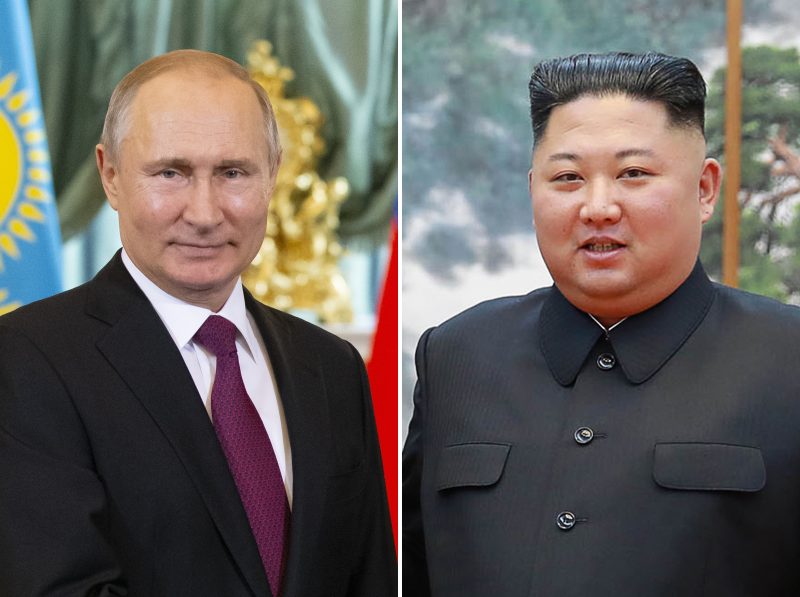Kim woos Putin as N. Korean labourers toil in Russia
Russian President Vladimir Putin will meet North Korea’s leader Kim Jong Un in Vladivostok (Alexander Zemlianichenko, Handout)
Seoul (AFP) – While North Korean leader Kim Jong Un is wined and dined with Vladimir Putin in Russia this week, around 10,000 of his citizens will be labouring around the country to earn money for his government.
Analysts say Kim is looking to strengthen economic links with Moscow with his nuclear negotiations with Washington deadlocked — and as he seeks a counterbalance to Beijing, currently Pyongyang’s key major ally and vital economic lifeline.
The pair are expected to meet in the eastern Russian port of Vladivostok, possibly on Wednesday or Thursday, in the first summit between the leaders of North Korea and Russia since Kim Jong Il met with Dmitry Medvedev eight years ago.
Labour is one of the North’s key exports and sources of cash. It provides workers under contracts with overseas entities, and rights groups say that the government seizes most of their salaries.
Their treatment “falls short of international labour standards”, Human Rights Watch said in a 2017 report, “with no right to freedom of association or expression, control by minders who limit freedom of movement and access to information from the outside world, long working hours and no right to refuse overtime”.
Nonetheless some specialists say the assignments are sought after by North Koreans, as once they have fulfilled their duties they have a chance to earn money for themselves.
Russia is Pyongyang’s second-biggest customer after China, according to the UN, with North Koreans working in mining, logging, textiles and construction, many of them in the country’s far east. Elsewhere, others toil in the Middle East.
The situation gives Kim and Putin a shared interest in easing the United Nations Security Council sanctions imposed on the North over its banned nuclear weapons and ballistic missile programmes.
Under UNSC Resolution 2397, approved in December 2017, “Member States shall repatriate to the DPRK all DPRK nationals earning income in that Member State’s jurisdiction… no later than 24 months from the date of adoption of this resolution”.
In a submission to UN sanctions officials, Russia said the number of North Koreans with valid work permits in the country had fallen by nearly two-thirds in 2018, from just over 30,000 to 11,490.
Last week, Pyongyang officials asked Moscow to continue to employ North Korean workers even after the deadline, specialist outlet NK News reported.
A UN report said Russian-based firms were continuing ship-to-ship transfers of oil with North Korean vessels, one of the ways Pyongyang seeks to circumvent restrictions on oil.
Russia has already called for sanctions to be eased and Ahn Chan-il, a North Korean defector and researcher in Seoul, told AFP: “Moscow probably has long-term plans and goals.
“What’s most important is having full access to the North’s cheap labour, on top of its mineral resources, if ever the existing sanctions are lifted and the North reduces the size of its army thereafter.”
Immediate sanctions relief was a major demand of the cash-strapped North’s when Kim met US President Donald Trump in February for a second summit that ultimately broke down in disagreement over what Pyongyang was prepared to give up in return.
– Coal trade –
North Korea, which holds most of the peninsula’s raw material reserves, was once wealthier than the South, but decades of mismanagement and the demise of its former paymaster the Soviet Union have left it deeply impoverished.
China is by far its biggest business partner, accounting for more than 90 percent of its trade according to estimates.
North Korean physical exports to Russia were worth just $1.98 million last year, according to International Trade Centre statistics, with musical instruments representing more than 70 percent of it.
In the other direction, the North imported $21.6 million-worth of mineral fuels and oil from Russia, out of total imports of $32.1 million.
But before the UN started to impose broader sectoral sanctions on the North in 2017, targeting its mineral and foodstuff exports and textile trade, Pyongyang and Moscow had been pursuing a number of joint economic projects.
They included restoring and expanding the 54-kilometre railway between the North Korean port of Rajin and Khasan in Russia.
Russia already exports coal by sea to China via Rajin — a business that is specifically exempted from UN sanctions.
Moscow has long had its eye on shipping more of its vast hydrocarbon reserves via the Korean peninsula to China and the energy-hungry but resource-poor economies of Japan, South Korea and Taiwan.
In 2011, Kim’s father Kim Jong Il travelled to Siberia and discussed gas pipeline and power line projects with then Russian president Dmitry Medvedev.
Kim died three months after the trip, and no significant progress has been made on the projects.
“Russia is in no hurry,” said analyst Ahn.
“But it is also well aware that if an inter-Korean railway is built and it also somehow gets connected to Russia, they know it will bring development to its underpopulated regions such as Siberia.”
Disclaimer: Validity of the above story is for 7 Days from original date of publishing. Source: AFP.


